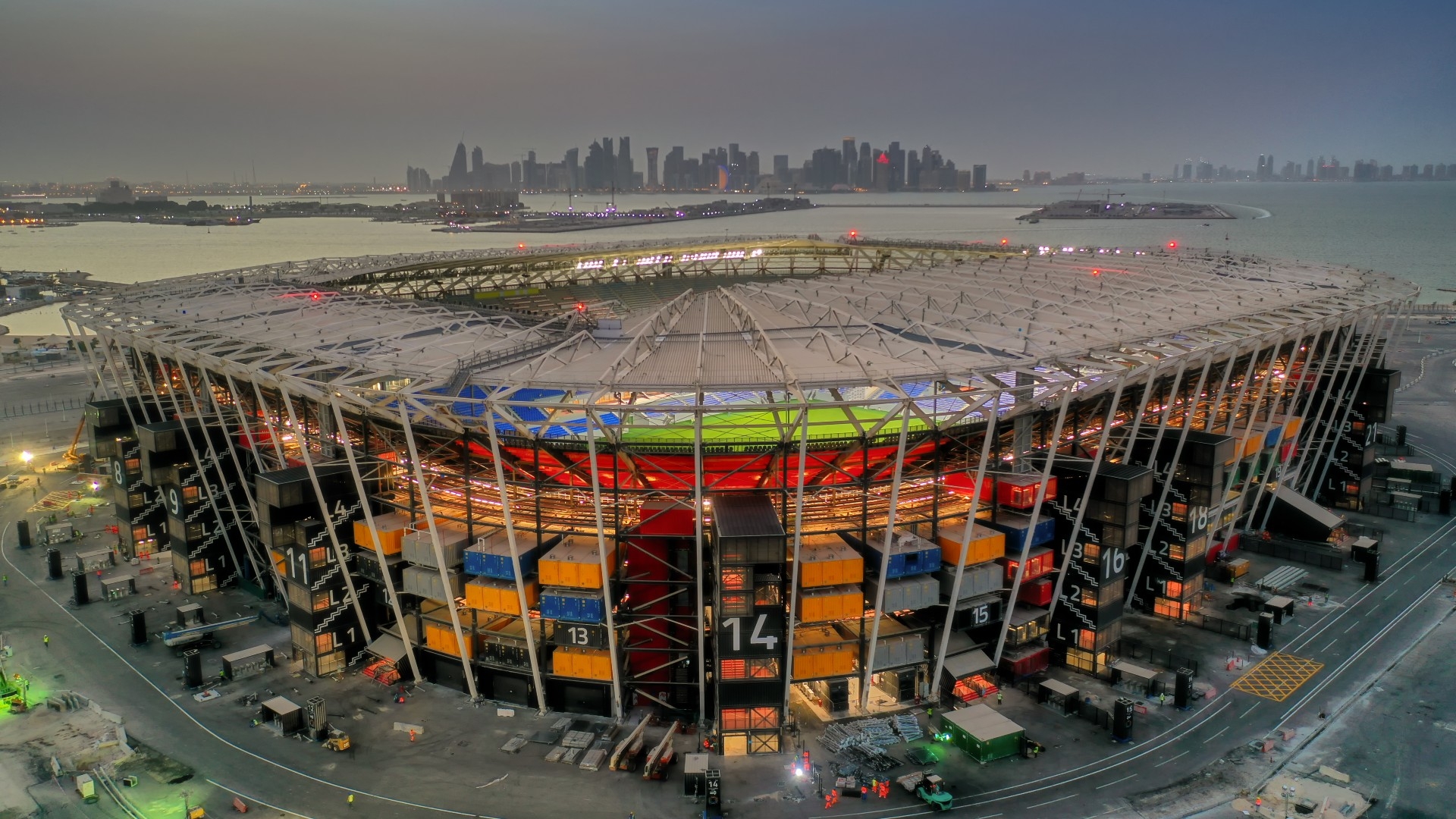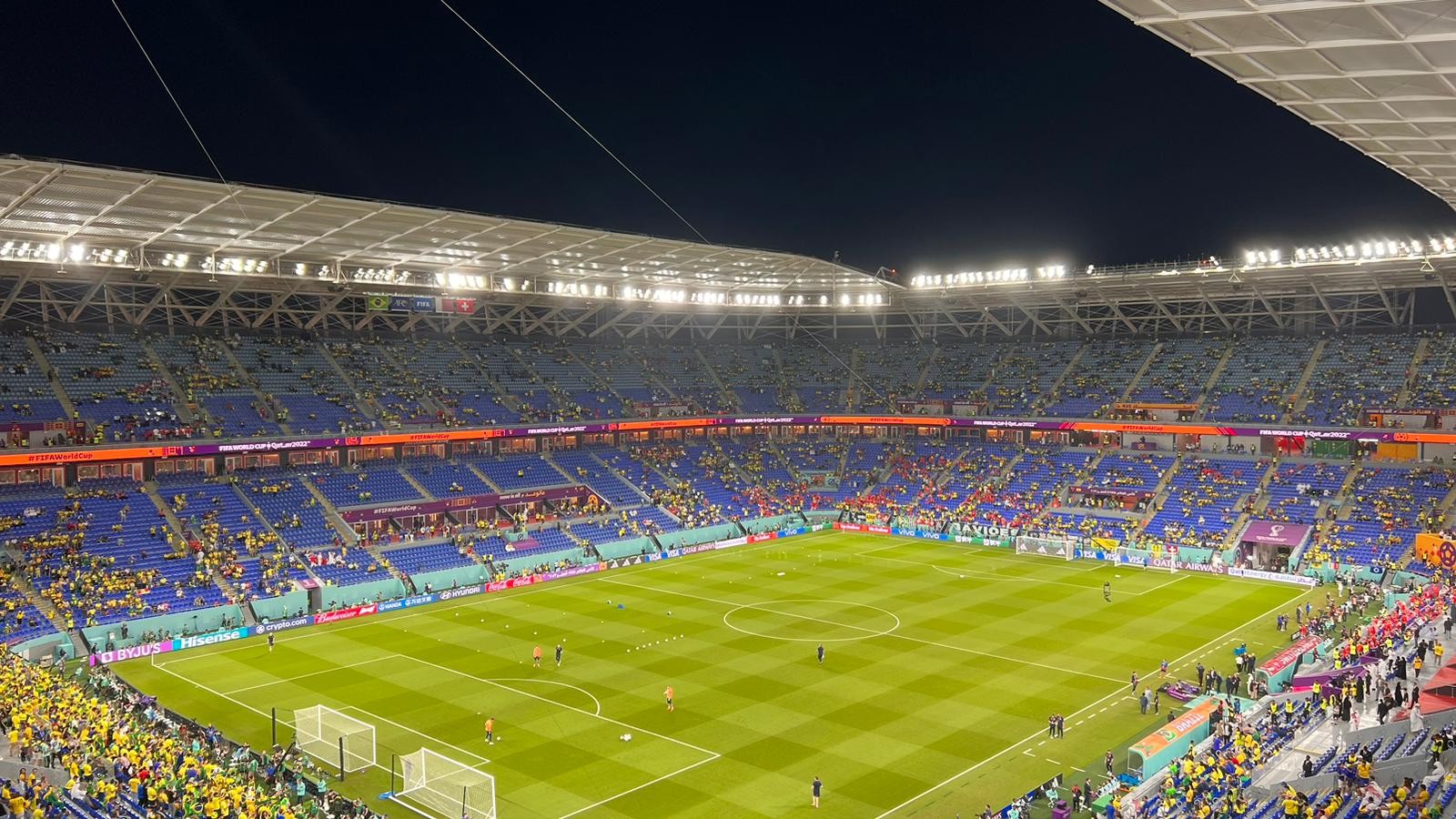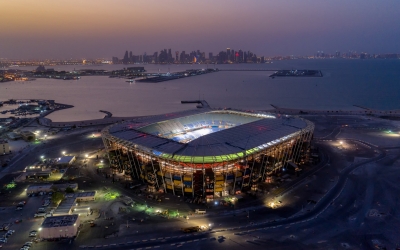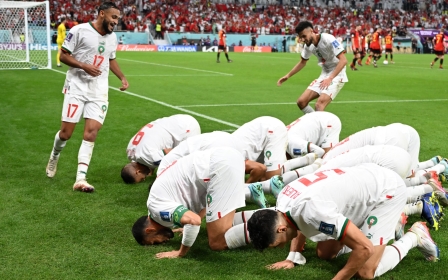Qatar World Cup: Final whistle blows on pop-up Stadium 974

The final whistle has blown on Qatar's Stadium 974.
Two weeks after it hosted its first match at the Qatar World Cup, the iconic stadium closed its doors on Monday after the round of 16 knock-out game between Brazil and South Korea.
Built on Doha's waterfront and boasting a spectacular view of the city skyline, the 44,000-capacity stadium will be dismantled and completely disappear after the tournament comes to a close on 18 December.
'The thrum of feet stomping on the container floors reverberating around the ground ... 974 is everything a World Cup ground should be'
- Thomas Ross Griffin, university professor
The short-lived venue was built to address questions that Qatar was spending billions of dollars on white-elephant locations that would have no use after the tournament.
Fans and residents told Middle East Eye that they loved the concept behind the demountable stadium, which was built from 974 certified shipping containers and is named after the country's international dialling code, +974.
New MEE newsletter: Jerusalem Dispatch
Sign up to get the latest insights and analysis on Israel-Palestine, alongside Turkey Unpacked and other MEE newsletters
"Of the three [stadiums] I've been to, Education City and Khalifa stadiums, '974' is by far and away the most atmospheric," Qatar University professor Thomas Ross Griffin told Middle East Eye.
"Rising out of the ground like that... coming through Old Doha to get there, the lights of West Bay blinking in the background, the thrum of feet stomping on the metal container floors reverberating around the ground... it was everything you wanted a World Cup ground to be."
Lasting legacy
While much has been said of the stadium only hosting a few matches, 974's legacy might be felt long after the tournament is over.
Reports have emerged that the stadium could be reassembled in Uruguay. If that does happen, it could play host to future World Cup matches if it is part of a pan-South American bid for the 2030 competition.
Qatar invested more than $200bn in building seven new stadiums, a new metro system, roads, a new airport and other major development projects in the run-up to the 29-day tournament.
Armstrong Vas, who has been vlogging on sports events in Qatar, went to Stadium 974 in March when the local World Cup organising committee held an event called Influencers Cup.
"The first thing I noticed was the sound when I set my foot on the metal. It was strange," he told MEE.
"But once you are into a football match, you don't worry about the material with which the stadium was built, right?" he added.
That feeling was echoed by Abdul Jabbar Chemmala, a legal coordinator at a Dubai-based law firm.
Chemmala said his friends in Qatar told him to attend last Friday's Serbia vs Switzerland match as the stadium would boast a vibrant atmosphere and was going to be decommissioned after the tournament.
"I thought then I can't miss the match because I'm never going to see the stadium again," Chemmala said.
He says his experience wasn't bad. At the stadium, he felt "wherever you sit you felt you were close to the pitch, which made the game engaging. Small is beautiful."
Habeeb Ayiroor, a business analyst at Doha's AK and Partners, an auditing firm, said he was shocked to see the temporary venue have such elaborate staircases, concession stands and bathrooms.
"The fact that everything, including the elevators and bathroom, was made of containers amused my parents greatly," Ayiroor told MEE.
He and his extended family watched the Brazil vs Switzerland match on 28 November. "I had gone to Lusail Stadium for a pre-World Cup musical event, but '974' had a better sound system."
But an HR professional, who didn't want to be named because of his company's ongoing contracts with the government, said while there was a lot of hype about the stadium's design and funky colours "there were not enough bathrooms which caused long queues".
What about the other venues?
Like other nations that have hosted the World Cup tournament, Qatar has come under intense scrutiny from human rights groups over its treatment of migrant workers.
Rights groups say that migrant workers from India, Nepal and Bangladesh have lived in squalor, and work without proper access to water and shelter from the sun.
Qatar says it's faced unfair scrutiny and that its labour conditions have actually improved because of its hosting of the tournament.
"What the World Cup did was it allowed for a significant number of reforms to be accelerated," said World Cup CEO chief Hassan Al Thawadi, at a think tank conference in October.
Critics, however, accuse Qatar of "greenwashing" and using the World Cup to bolster its green credentials and distract from its human rights record.
Still Qatar has maintained that if Stadium 974 is reused only once, they estimate its emissions would be lower than a permanent one.
The gas-rich nation says it has developed plans for the other six stadiums after the games are over.
The Zaha Hadid-designed Al Janoub will have half its seats pulled out and "donated to football development projects overseas", but the stadium itself will remain in operation and be used by a local football club.
Al Khor's tent-like Al Bayt Stadium will become a luxury hotel with a convention centre which can hold tens of thousands of people.
The stadium at Lusail, the country's largest stadium, will be a community hub. All together, Qatar has promised to give away around 170,000 seats after the tournament closes.
Middle East Eye delivers independent and unrivalled coverage and analysis of the Middle East, North Africa and beyond. To learn more about republishing this content and the associated fees, please fill out this form. More about MEE can be found here.






